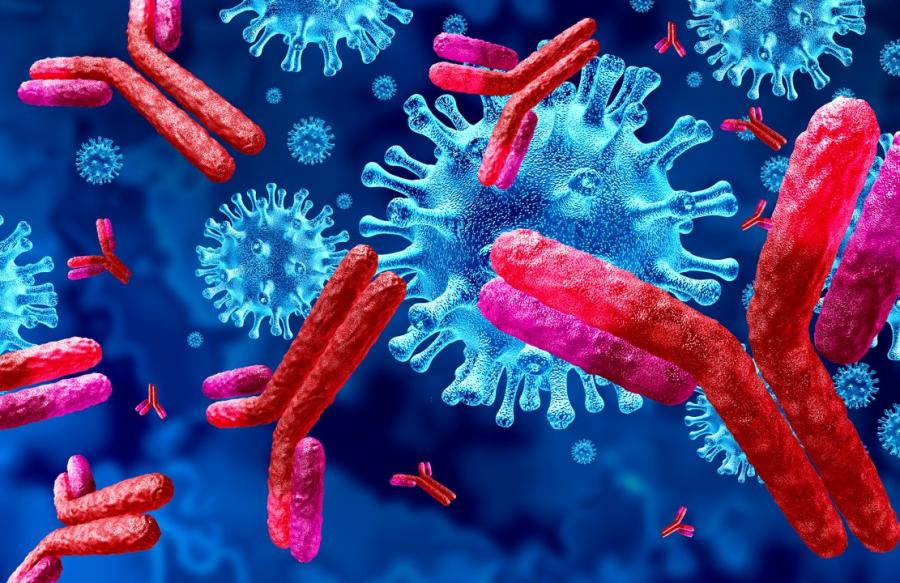A new study from China showed that antibodies quickly faded in asymptomatic and symptomatic COVID-19 patients during convalescence, raising questions about whether the disease leads to long-lasting immunity to the virus afterward.
The study, which focused on 37 asymptomatic and 37 symptomatic patients, showed that more than 90% of both groups showed pronounced decreases in levels of SARS-COV-2-specific immunoglobulin G (IgG) antibodies within 2 to 3 months after the onset of infection. , according to a report published yesterday in Nature Medicine. Furthermore, 40% of the asymptomatic group tested negative for IgG antibodies 8 weeks after they emerged from isolation.
The authors said the findings suggest that it could be risky to assume that recovered patients are immune to reinfection, which may have implications for how long to maintain physical distance restrictions.

The patients included in the study were among 2,088 people tested for COVID-19 because they were close contacts of confirmed patients in China's Wanzhou district. Of those who tested positive, 60 had had no symptoms in the previous 2 weeks, but were hospitalized for isolation. Of them, 23 people who had mild symptoms on admission or shortly thereafter were excluded from the study, leaving 37.
For a control group, the researchers identified 37 mildly symptomatic COVID-19 patients matched to the asymptomatic group for age, sex, and comorbidity. For further comparisons, they also selected 37 sex- and age-matched individuals who tested negative. The median age of the asymptomatic patients was 41 years and 22 were women.
Antibody levels dropped 70%
One of the main findings was that IgG levels in 93% (28/30) of the asymptomatic group and 97% (30/31) of the symptomatic group decreased considerably during the early convalescence phase (at 8 weeks after the hospital discharge). Antibody levels fell 71.1% in asymptomatic patients and 76.2% in the symptomatic group.
"Additionally, 40.0% (12/30) of asymptomatic individuals, but only 12.9% (4/31) of symptomatic individuals, became IgG seronegative" during that time, the report says.
The researchers also found decreases in specific neutralizing antibodies (antibodies that can neutralize a pathogen on their own, without the help of other elements of the immune system), but the decreases were not as great as with IgG.
Decreases in neutralizing antibodies were observed in 81% (30/37) of the asymptomatic group and 62% (23/37) of the symptomatic group. The mean decreases in the level of antibodies were 8.3% in the asymptomatic group and 11.7% in the symptomatic patients.
The report also notes that IgG levels were significantly higher in symptomatic patients than in asymptomatic patients in the acute and convalescent phases of infection.
Longer shedding in the asymptomatic group
In other findings, the researchers said that asymptomatic patients shed the virus for longer than symptomatic patients, a median of 19 days versus 14 days. But they cautioned that detectable viral shedding does not necessarily mean that the viral particles spread were infectious.
The researchers also measured the levels of various cytokines and chemokines in the patients and concluded that "asymptomatic individuals had a reduced inflammatory response characterized by low circulating concentrations of cytokines and chemokines."
The authors note that their findings contrast with what is known about the duration of antibodies against two other key coronaviruses, SARS-CoV, which causes severe acute respiratory syndrome (SARS) and MERS-CoV (respiratory syndrome coronavirus). Middle East). Previous findings indicate that antibodies to these viruses last at least a year and often longer, they said.
Combined with certain previous findings on COVID-19 antibodies, the researchers concluded that their results "could indicate the risks of using COVID-19 'immunity passports' and support the prolongation of public health interventions, including social distancing, hygiene, isolation of the elderly - risk groups and generalized evidence ".
The study did not address cellular immunity to COVID-19, that is, immune responses that involve T cells rather than antibodies. Some previous studies have found SARS-CoV-specific T cells in a high percentage of convalescent COVID-19 patients.